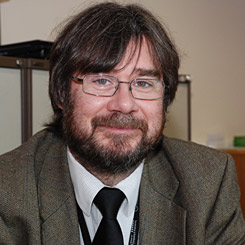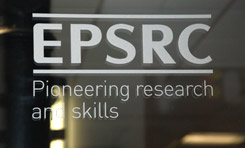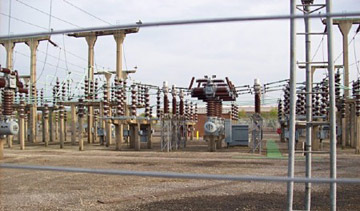£670,000 EPSRC grant for new professor
Tue, 02 Apr 2013 13:09:00 BST
Ian is back on home turf as Professor of Radio Science and Wireless Systems Engineering
 A £670,000 research project headed by a new University of Huddersfield professor promises major economic benefits, higher safety standards and less likelihood of power cuts by transforming the techniques for detecting potentially dangerous and destructive faults in electricity sub-stations.
A £670,000 research project headed by a new University of Huddersfield professor promises major economic benefits, higher safety standards and less likelihood of power cuts by transforming the techniques for detecting potentially dangerous and destructive faults in electricity sub-stations.
Ian Glover has been appointed Professor of Radio Science and Wireless Systems Engineering and a key area of his research is the use of easily-installed wireless sensor networks in sub-stations. This technology is designed to locate and diagnose imminent system faults, so that repairs can be made.
Professor Glover explains that when the insulation of cables and other power equipment becomes old or damaged, it radiates microwave energy, known as partial discharge.
“This can be picked up by radio receivers and by monitoring the intensity of this microwave energy, you can predict when an item of plant is going to fail.”
Traditionally, partial discharge has usually been detected by a technician walking the substation with a radio receiver and a pair of headphones.
“He listens to an audio signal that simply gives some basic information about whether partial discharge is present or not and with a bit of luck, the closer he is to the partial discharge the more intense it sounds,” said Professor Glover.
“That might typically be only done once a year, but that is not enough. A piece of equipment can degrade very quickly.”
In the worst cases, equipment can explode, leading to power cuts and massive repair costs plus safety risks – although modern sub-stations in the UK are not generally manned.
 Professor Glover is the lead investigator on the £670,000 project, funded by the Engineering and Physical Sciences Research Council (EPSRC), which will develop the principle of wireless sensor networks, which can be monitored centrally.
Professor Glover is the lead investigator on the £670,000 project, funded by the Engineering and Physical Sciences Research Council (EPSRC), which will develop the principle of wireless sensor networks, which can be monitored centrally.
“You get a quicker diagnosis and it means that you can move from planned maintenance to condition-based maintenance,” explained Professor Glover. “You don’t have to maintain everything quite so often if its health is being measured all the time. You can wait until something is about to go wrong.”
This would produce efficiency savings, cut down on the cost of equipment replacement and avoid the large fines levied on utility companies in the wake of power cuts.
Free space radiometers
 The novel feature of Professor Glover’s EPSRC-funded research is that he would use free space radiometers to sense microwave radiation intensity. These instruments are not attached to the power cables and can be installed without switching high voltage equipment off, so there is no interruption to power supplies.
The novel feature of Professor Glover’s EPSRC-funded research is that he would use free space radiometers to sense microwave radiation intensity. These instruments are not attached to the power cables and can be installed without switching high voltage equipment off, so there is no interruption to power supplies.
“They can be reconfigured and installed very quickly and very conveniently and do not require demanding time synchronisation.”
Professor Glover’s colleagues on the four-and-a half-year project will include physicist and engineer Dr Maria de Fatima Queiroz Vieira, who retires soon from her post at the Federal University of Campina Grande in her native Brazil to take up an honorary appointment at the University of Huddersfield.
PhD students and post-doctoral researchers will also be recruited for the project – which will take place in a new, specially-equipped £100,000 lab at the University of Huddersfield – and Professor Glover will also work with colleagues from Strathclyde University, where until recently he was Reader in Radio Science and Wireless Communications.
Back in Yorkshire
The University of Huddersfield appointment takes him full circle in several ways, says Professor Glover. It brings him back to his home patch – he was born and brought up in Bailiff Bridge, near Brighouse – and he began his working life in the power supply industry, working for the former Yorkshire Electricity Board before he embarked on academic study, drawn in particular to the subject of microwaves and their use in communication.
He is co-author of a standard work on the subject, entitled Digital Communications (http://catalogue.pearsoned.co.uk/educator/product/Digital-Communications/9780273718307.page)
His current research is a perfect fit with the University of Huddersfield, he says, because of its well-established expertise in condition monitoring and diagnostic engineering. Professor Glover will also teach several modules within the School of Computing and Engineering, where he is Head of Engineering and Technology.
“I have come to Huddersfield because I admire its strategy of turning itself into a research-led university, while simultaneously maintaining a commitment to the widening of access to higher education” said Professor Glover.
“Many people have said that those two objectives are mutually exclusive. Huddersfield has not only asserted the contrary, but is demonstrating it.”







